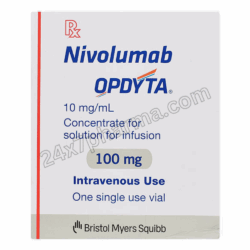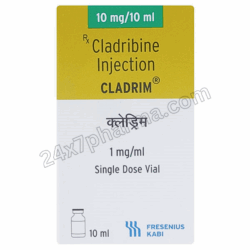LuciAbe 50mg, Abemaciclib Tablets
LuciAbe 50mg contains abemaciclib, a targeted therapy utilized in treating specific breast cancer types. This document outlines detailed information regarding its application, operational mechanism, potential side effects, and other essential details.
What is LuciAbe (Abemaciclib)?
LuciAbe (Abemaciclib) is a brand name (which may vary regionally; Verzenio is the primary brand name in many areas) for abemaciclib, a kinase inhibitor. Cyclin-dependent kinase (CDK) 4 and 6 inhibitors are a class of medications that are essential for cell division. By hindering CDK4 and CDK6 activity, abemaciclib aids in decelerating or halting the growth and dissemination of cancer cells.
Mechanism of Action:
Abemaciclib selectively obstructs the activity of CDK4 and CDK6 enzymes essential for cell cycle progression, particularly during the transition from the G1 to the S phase, where DNA replication occurs. In numerous cancers, these kinases are overactive, resulting in unchecked cell proliferation.
Abemaciclib works by inhibiting CDK4 and CDK6:
- Prevents Rb Protein Phosphorylation: When unphosphorylated, the retinoblastoma (Rb) protein functions as a tumor suppressor, hindering cells from advancing to the S phase. Rb becomes inactive due to phosphorylation by CDK4/6, which promotes cell cycle advancement. Abemaciclib maintains Rb in its functional, unphosphorylated form, thus inhibiting cell cycle advancement.
- Promotes Cell Cycle Arrest and Suppresses Cancer Cell Growth: This process aids in retarding the proliferation of hormone receptor-positive (HR+), HER2-negative breast cancer cells where the CDK4/6 pathway is frequently dysregulated.
Usage Instructions
LuciAbe 50mg tablets should be taken orally twice a day, approximately 12 hours apart, at consistent times each day. It can be taken with or without food, but maintaining consistency regarding meals is advised. Swallow the tablets whole with water—do not crush, chew, or split them. If a dose is missed, do not take an extra dose; just resume with the next scheduled dose. If vomiting happens after taking a dose, take the next planned dose instead of taking another one.
Other Dosages
Abemaciclib is also available in strengths beyond 50mg, including 100mg, 150mg, and 200mg. Your doctor will prescribe an appropriate dosage based on several criteria, such as:
- The specific type and stage of breast cancer.
- Whether LuciAbe is used alone or alongside other therapies (like endocrine therapy).
- Your reaction to the drug and any adverse effects you may have encountered.
Your doctor may modify the dosage throughout treatment depending on these factors.
Side Effects
LuciAbe may induce various side effects, some of which could be severe. It’s important to recognize these potential effects and discuss any concerns with your physician promptly.
Typical side effects encompass:
- Diarrhea: A very common side effect, potentially severe, especially in the initial month. Your doctor may suggest antidiarrheal medications and guidance on hydration.
- Fatigue: Common fatigue or weakness.
- Nausea and Vomiting: Manageable occurrences.
- Abdominal Pain: Discomfort in the region of the stomach.
- Decreased Appetite: Disinterest in eating.
- Headaches: Occasional pain in the head.
- Dizziness: Lightheadedness or unsteadiness.
- Infections: Due to reduced white blood cell counts, increasing infection risk. Report signs of infection (fever, chills) immediately.
- Breathlessness and exhaustion are symptoms of anemia.
- Thrombocytopenia: Low platelet counts causing easy bruising or bleeding.
- Leukopenia or Neutropenia: Heightened infection risk.
- Alopecia: Thinning or loss of hair, generally less severe compared to conventional chemotherapy.
- Rash and Itching: Possible skin reactions.
Severe side effects demanding urgent medical attention include:
- Severe or Persistent Diarrhea: Risk of dehydration.
- Infection Signs: chills or fever, a chronic cough, and uncomfortable urine.
- Blood Clots: Pain, swelling, redness in limbs; chest pain; shortness of breath; rapid heartbeat.
- Interstitial Lung Disease: Cough or difficulty breathing symptoms.
This is not an exhaustive list; your doctor will discuss potential side effects in detail, and routine blood tests will monitor for these issues.
Prescription Information:
LuciAbe (abemaciclib) requires a prescription and can only be obtained through a valid order from a qualified healthcare provider (oncologist), specifying dosage, frequency, and treatment duration.
Interactions:
Abemaciclib may interact with other drugs, changing how well they work or making adverse effects worse :
- Prescription drugs
- Over-the-counter products
- Vitamins and supplements
- Herbal remedies
Significant interactions include:
- Strong CYP3A4 Inhibitors: Drugs that significantly inhibit the CYP3A4 enzyme may elevate abemaciclib levels in blood, increasing side effects.
- Strong CYP3A4 Inducers: Medications that strongly stimulate the CYP3A4 enzyme may lower blood abemaciclib levels, reducing effectiveness. Examples include rifampin and St. John’s Wort.
For a detailed list of interactions and recommendations, speak with your physician.
FAQs:
-
What should I do if I miss a dose of LuciAbe 50mg?
If you miss a dose of LuciAbe 50mg (Abemaciclib), take it as soon as you remember on the same day.
-
Are there any dietary restrictions while taking LuciAbe 50mg?
There are no specific dietary restrictions while taking LuciAbe 50mg, but it is important to maintain a healthy and balanced diet.
-
How should I store LuciAbe 50mg?
Store LuciAbe 50mg at room temperature, between 20°C to 25°C (68°F to 77°F), in a dry place away from heat, moisture, and direct sunlight.
-
Is LuciAbe 50mg a cure for breast cancer?
LuciAbe 50mg is not a cure for breast cancer, but it can help to slow the growth of cancer cells and improve symptoms. It is important to continue regular check-ups and follow your doctor’s instructions for the best outcome.
Conclusion:
LuciAbe 50mg (abemaciclib) offers valuable targeted therapy for specific breast cancer types, functioning by inhibiting CDK4 and CDK6 to slow cancer cell growth. While it is generally well-tolerated, side effects may arise and require management. Adhere to your oncologist’s prescription and engage in ongoing communication with your healthcare team for any inquiries, concerns, or side effects. This comprehensive guide aims to enhance understanding of LuciAbe but does not replace your medical provider’s advice tailored to your unique needs.









